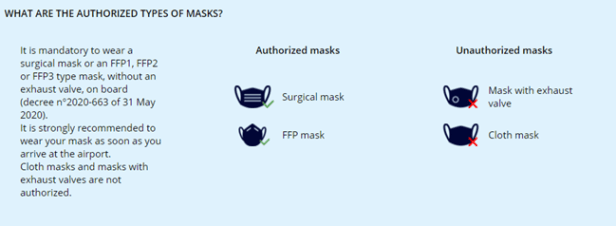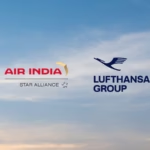Ever since the outbreak of coronavirus the wearing of a face mask is compulsory in all public places, particularly contact zones such as airports and airplanes. With the start of non-essential travel, we must be mindful of not only wearing the safest facial covering but also one that is deemed acceptable by airlines.
Most airlines do not specify the type of mask they require passengers to wear, but there are a few that do. Lufthansa stated on 1 February 2021 that ‘‘only masks of the following standard will be permitted on flights to and from Germany: FF92, KN95, or N95 standard, as well as surgical masks [will be] obligatory: when boarding, on board, [or] when leaving the aircraft.’’

(The caveat being that passengers under two years of age and/or are medically exempt can eschew the rule – please refer to each respective website for further information.)
Which is the Best?
Typically, a standard face mask should consist of three protective layers that helps stop the free movement of germs from in and outside of the mask, and it is to cover the mouth, nose, and chin by using the attached ear loops – as recommended by World Health Organization.
So what is the difference between FFP, KN95, N95 to a surgical mask?
FFP stands for Filtering Protection Piece and protects against toxic aerosols. They are ranked by their level of protection, 1 being the lowest form, 3 being the highest. NHS Wales says that FFP3 masks should be used when undertaking aerosol generating duties or worn when caring for patients affected by COVID-19.
What about N95 or KN95 masks? Both masks are a type of filtering facepiece respirator, they consist of multiple layers of synthetic material and are made to capture small particles, the difference being N95 is made in the United States and the latter is made in China.

However according to a HSE report such masks lack safety compliance with EU laws and should be avoided, that we should opt for a standard surgical mask or the ones mentioned above.
Problems with Masks
Maskne – a noun coined by the coronavirus pandemic. It is when the wearing of a mask produces acne. Masks can cause a humid environment that can cause dirt, sweat and bacteria to build up and block pores.
Maskne could be a further concern for flight attendants who are required to wear makeup as part of their uniform. Use of a mask could cause pores to open up still further to absorb bacteria and coverage as well. Flight attendants such as Youtuber Margot for Emirates has commented that masks are causing her skin to break out –with hopes that a good clay face mask will solve the problem.

Indeed if masks become dirty, wet, or damaged, or if we have touched the inside of it without having washed or sanitised our hands, then we should change our masks. There also lies the problem of removing our mask before and during mealtime.
But with the threat of the coronavirus still present, we should switch our focus on the benefits of wearing a mask, that is to protect yourself and others, choose one that is safe, comfortable and effective, factoring in the need to remove and change them when necessary and to plan a good skincare regime for when we arrive at our destination.
Featured image: © | Air France
So which do you think is the best mask to wear to the airport or on board a plane? Let us know in the comments below.









